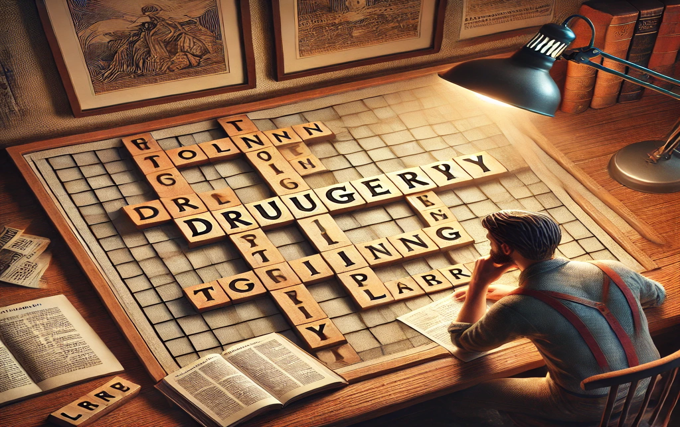Language has a remarkable capacity to convey intricate feelings and ideas in a few number of words. The simplicity and attractiveness of “7 Little Words” set it apart from the other linguistic games and puzzles. In this well-known word game, players solve clues to find seven words that suit particular definitions while enjoying themselves and developing critical thinking skills. One of the most fascinating hints that is frequently found is “drudgery.” Despite its seeming simplicity, the word’s profundity and its seven-letter equivalent provide an intriguing look at language and life.
Understanding Drudgery
Fundamentally, the term “drudgery” conjures up a picture of exhausting, repetitive work. It denotes monotonous labor that brings little joy or fulfillment. Drudgery is a common sensation, whether it is with mundane professional tasks, household duties, or any other work carried out out of duty rather than passion. It represents the ordinary parts of life that might be depressing to many.
The word itself comes from the Middle English word “drudge,” which refers to a person who does low-level labor. It changed over time to depict the essence of this type of job rather than the person doing it. It is now used interchangeably with slog, grind, and toil.
Finding a suitable equivalent for “drudgery” in the context of the “7 Little Words” puzzle requires players to condense the meaning of the term into a concise seven-letter answer. In addition to improving vocabulary, this method fosters a greater understanding of the English language’s complexity.
The Appeal of Word Games
The capacity of word games like “7 Little Words” to blend pleasure and knowledge has led to their enormous appeal. In contrast to conventional crossword puzzles, this game streamlines the pattern by giving players seven clues and letter pieces that need to be put together to form words. Players of diverse ages and linguistic backgrounds can play it because it doesn’t have a grid.
These kinds of puzzles are appealing because they are both difficult and soothing. A sense of achievement is gained from solving clues, and playing improves cognitive abilities like pattern identification, language development, and lateral thinking. Because clues like “drudgery” speak to common human experiences, they are very compelling and make the game accessible.
Solving “Drudgery” in Seven Letters
To solve the clue “drudgery” in “7 Little Words,” one must find a synonym that fits the definition of the term. Typical answers include terms like “toiling,” “grind,” or “labor.” Each of these selections captures the idea of drudgery in a few letters and illustrates a different facet of it.
For instance:
- Toiling: This synonym emphasizes the act of continuous, hard work, often with a sense of struggle.
- Grind: This term conveys the repetitive and exhausting nature of certain tasks, often associated with daily routines.
- Labor: While broader in scope, this word highlights the physical and mental exertion involved in work.
Word puzzles are beautiful because they force players to think about an idea from several angles. In addition to solving the challenge, players gain a deeper comprehension of the meaning of the term by investigating different synonyms.
Drudgery in Literature and Culture
A common motif in literature, art, and society has been drudgery. The idea of monotonous toil functions as a potent narrative device in everything from the arduous lives of characters in Charles Dickens’ writings to the repetitious routines portrayed in contemporary movies. It frequently represents societal limitations, individual hardships, and the human need for autonomy and contentment.
In literature, drudgery is often juxtaposed with triumphant and joyful moments. This contradiction demonstrates how the human spirit can persevere in the face of hardship. For instance, Pip, the main character in Dickens’ “Great Expectations,” endures years of drudgery before discovering meaning and purpose in his life. In a similar vein, contemporary literature such as Viktor Frankl’s “Man’s Search for Meaning” examines how people can find meaning in life and overcome even the most trying situations.
Drudgery is portrayed in culture in ways that go beyond fiction. Nowadays, discussions on mental health and work-life balance frequently center on lessening the boredom of both personal and professional commitments. Words like “burnout” and “hustle culture” highlight the negative effects of constant work and force us to reconsider what makes for meaningful and satisfying work.
Drudgery and Modern Society
Drudgery can take many different forms in the fast-paced world of today. Some people find it to be the monotonous nature of office work, which is marked by countless meetings and emails. For others, it’s the emotional strain of providing care or the physical tiredness of manual labor. Regardless of the particular situation, a lack of independence, originality, or recognition in one’s work is frequently the root cause of drudgery.
Discussions concerning the future of drudgery have been triggered by the rise of automation and artificial intelligence. On the one hand, technological developments promise to remove mundane jobs, allowing people to focus on more imaginative and satisfying activities. However, there is worry that new types of monotony and discontent may result from the loss of traditional jobs.
A diversified strategy is needed to combat drudgery. Companies can contribute by creating work-life balance, providing chances for professional development, and creating supportive work environments. On a personal level, people can fight drudgery by establishing objectives, deriving significance from minor victories, and engaging in pursuits that make them happy and fulfilled outside of work.
Lessons from “7 Little Words”
The straightforward message of “7 Little Words” provides valuable guidance for handling life’s challenges. Like figuring out the puzzle of “drudgery,” conquering life’s obstacles frequently necessitates dissecting them into smaller parts and considering various viewpoints.
Players gain abilities outside of the game by solving puzzles. The problem-solving skills needed in real-life scenarios are reflected in the capacity to think critically, adjust to new challenges, and make connections between seemingly unrelated ideas. We are reminded by hints such as “drudgery” that even the most ordinary parts of life have deeper meanings that are just waiting to be discovered.
Conclusion
Drudgery encourages contemplation on the nature of work, purpose, and resilience, whether it is experienced in day-to-day life or as a clue in a word puzzle. In addition to improving language proficiency, the “7 Little Words” puzzle challenges players to consider more general philosophical issues regarding the worth of hard work and the search for fulfillment.
Examining the various dimensions of drudgery helps us better understand how well language can convey human experiences. “7 Little Words” demonstrates the timeless appeal of word games and their capacity to foster a sense of connection with the outside world by turning a straightforward clue into a chance for exploration. Even the most boring parts of life can be turned into worthwhile exploration and development journeys with imagination and curiosity.


